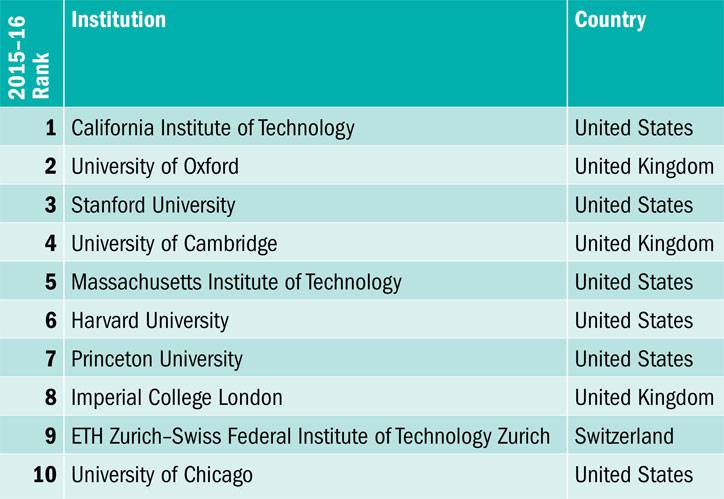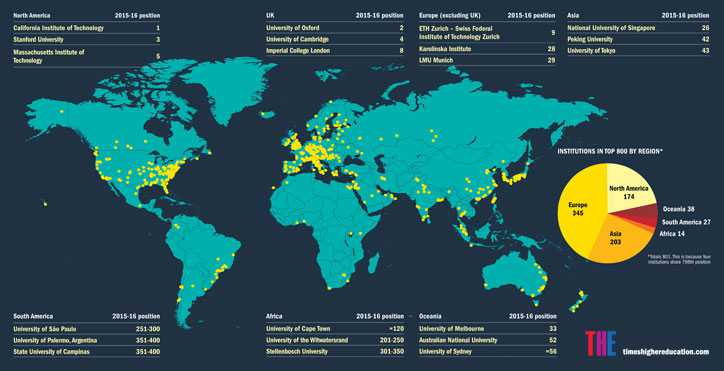World University Rankings 2015-2016: top 10
World University Rankings 2015-2016: results announced
US continues to lose its grip as institutions in Europe up their game

The world dominance of universities in the US has further waned in the Times Higher Education World University Rankings 2015-2016, despite the fact that the country boasts almost a fifth of institutions in the table.
A total of 147 US universities feature in the top 800 – the largest THE rankings to date – including the California Institute of Technology, which claims pole position for the fifth consecutive year.
However, there are signs of decline for the traditional Western powerhouse lower down in the table. The US now has 63 universities in the top 200, down from 74 last year, and 77 the year before. Six of these make the top 10, compared with seven last year; after Caltech, these are: Stanford (third), Massachusetts Institute of Technology (fifth),Harvard (sixth - its first time outside the top four in the rankings' 12-year history), Princeton (seventh) and theUniversity of Chicago (10th). The UK's universities of Oxford (second), Cambridge (fourth) and Imperial College London (eighth), and Switzerland's ETH Zurich – Swiss Federal Institute of Technology Zurich (ninth) fill the rest of the top 10.
Phil Baty, THE rankings editor, said that the US' movement is to some degree owing to significant improvements to the rankings' data sources this year, with "improved coverage of research not published in English and a better geographical spread of responses to our academic reputation survey".
However, he added that it also demonstrates that the US' leading status as the world's top magnet for academic and student talent "cannot be taken for granted", citing figures that show that 47 states in the US have implemented higher education funding cuts since the global recession in 2008.
World University Rankings 2015-2016: top 10
Simon Marginson, professor of international higher education at the UCL Institute of Education, said that US research is "not declining in the absolute sense", but rather "other countries are improving and crowding into the top 200 space".
One of these competitor nations is the UK, which has improved its standing this year. A total of 78 UK institutions feature in the top 800, with 34 of these sitting in the first quarter, up from 29 last year.
Other countries in Europe have also performed well. Germany has 20 universities in the top 200, a rise of eight since last year, while the Netherlands has 12 in the first quarter, up from 11. Meanwhile, Switzerland's ETH Zurich is the first non-Anglo-American institution to make the top 10 for a decade.
Overall, Europe has 345 universities in the world top 800, meaning its institutions comprise more than two-fifths of the table.
Professor Marginson said that the results reveal that "15 years of consolidation of higher education, in the Nordic countries, the Low Countries and German-speaking world, is now bearing fruit".
In particular, he cited national programmes to foster research concentrations, the European Research Area grant programmes, the Bologna-instigated reforms, and "carefully managed immigration policies that decouple high-talent recruitment from other forms of migration" as strategies that have improved their university systems.
Top universities by region
"Europe appears to be becoming more competitive at postdoctoral stage – the point where the US has long been overwhelmingly dominant in global flows of talent," he added.
However, he warned that the UK's position in the rankings may decline "over a decade or so" if it continues to be "semi-paralysed by immigration policies", while an exit from the European Union would have "sharper, earlier effects".
"Research depends on the free movement of both ideas and people, and countries that adopt a more closed stance pay the price in the end. This is a prime cause of the substantial long-term declines in the global position of research in both Japan and Russia," he said.
Overall, institutions from 70 countries, 29 more than last year, feature in this year's rankings, with several countries including Indonesia, Bangladesh and Kenya being represented for the first time.
The THE World University Rankings use 13 performance indicators to examine universities' strengths. View the full methodology, along with the World University Rankings 2015-2016 top 800.
Listen to the World University Rankings 2015-2016 podcast
Asia gains new number one
The National University of Singapore is the number one institution in Asia – the first time the city-state has claimed the continent's top spot in the rankings' 12-year history.
NUS is in 26th position overall in the rankings, with the next highest Asian institutions – China's Peking Universityand Japan's University of Tokyo – taking 42nd and 43rd place respectively.
Overall, this year's rankings results provide a mixed picture for Asia; while China's performance remains steady, with the country claiming 37 institutions in the top 800, including two in the elite top 50, Japan and South Korea have both fallen down the list. Japan has just two institutions in the world top 200, compared with five last year, while South Korea has just one in the top 100, down from three.
But despite its diminishing performance, Japan still has strength in depth: it is third place in the world in terms of the number of institutions represented, with 41 appearing in the top 800.
"Tough times for Japan and disappointment for South Korea mean that leading Asian nations' grip on the higher ranks of the THE World University Rankings is loose," said Phil Baty, THE rankings editor.
"Many institutions, particularly in East Asia, have been focusing heavily on attaining world-class status, backed with funding and powerful political will. But this ranking demonstrates how difficult a task this is, as universities right across the world continue to improve."
Listserv moderated by Toyin Falola, University of Texas at Austin
To post to this group, send an email to USAAfricaDialogue@googlegroups.com
To subscribe to this group, send an email to USAAfricaDialogue+subscribe@googlegroups.com
Current archives at http://groups.google.com/group/USAAfricaDialogue
Early archives at http://www.utexas.edu/conferences/africa/ads/index.html
---
You received this message because you are subscribed to the Google Groups "USA Africa Dialogue Series" group.
To unsubscribe from this group and stop receiving emails from it, send an email to usaafricadialogue+unsubscribe@googlegroups.com.
For more options, visit https://groups.google.com/d/optout.







No comments:
Post a Comment